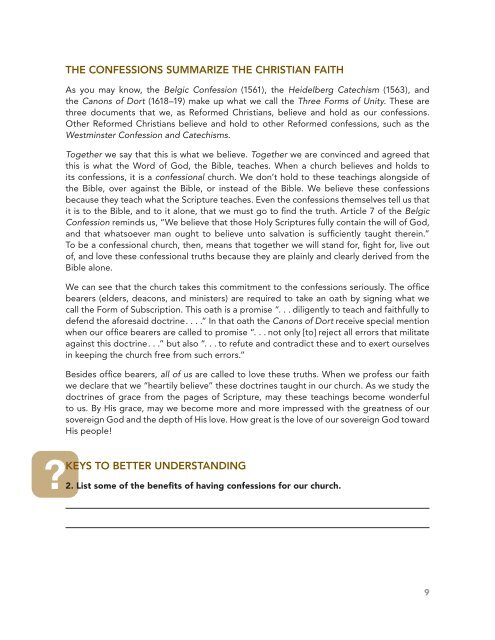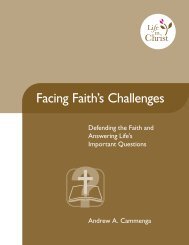The Doctrines of Grace - Reformed Fellowship
The Doctrines of Grace - Reformed Fellowship
The Doctrines of Grace - Reformed Fellowship
You also want an ePaper? Increase the reach of your titles
YUMPU automatically turns print PDFs into web optimized ePapers that Google loves.
<strong>The</strong> conFessions summaRize <strong>The</strong> chRisTian FaiTh<br />
As you may know, the Belgic Confession (1561), the Heidelberg Catechism (1563), and<br />
the Canons <strong>of</strong> Dort (1618–19) make up what we call the Three Forms <strong>of</strong> Unity. <strong>The</strong>se are<br />
three documents that we, as <strong>Reformed</strong> Christians, believe and hold as our confessions.<br />
Other <strong>Reformed</strong> Christians believe and hold to other <strong>Reformed</strong> confessions, such as the<br />
Westminster Confession and Catechisms.<br />
Together we say that this is what we believe. Together we are convinced and agreed that<br />
this is what the Word <strong>of</strong> God, the Bible, teaches. When a church believes and holds to<br />
its confessions, it is a confessional church. We don’t hold to these teachings alongside <strong>of</strong><br />
the Bible, over against the Bible, or instead <strong>of</strong> the Bible. We believe these confessions<br />
because they teach what the Scripture teaches. Even the confessions themselves tell us that<br />
it is to the Bible, and to it alone, that we must go to find the truth. Article 7 <strong>of</strong> the Belgic<br />
Confession reminds us, “We believe that those Holy Scriptures fully contain the will <strong>of</strong> God,<br />
and that whatsoever man ought to believe unto salvation is sufficiently taught therein.”<br />
To be a confessional church, then, means that together we will stand for, fight for, live out<br />
<strong>of</strong>, and love these confessional truths because they are plainly and clearly derived from the<br />
Bible alone.<br />
We can see that the church takes this commitment to the confessions seriously. <strong>The</strong> <strong>of</strong>fice<br />
bearers (elders, deacons, and ministers) are required to take an oath by signing what we<br />
call the Form <strong>of</strong> Subscription. This oath is a promise “. . . diligently to teach and faithfully to<br />
defend the aforesaid doctrine . . . .” In that oath the Canons <strong>of</strong> Dort receive special mention<br />
when our <strong>of</strong>fice bearers are called to promise “. . . not only [to] reject all errors that militate<br />
against this doctrine . . .” but also “. . . to refute and contradict these and to exert ourselves<br />
in keeping the church free from such errors.”<br />
Besides <strong>of</strong>fice bearers, all <strong>of</strong> us are called to love these truths. When we pr<strong>of</strong>ess our faith<br />
we declare that we “heartily believe” these doctrines taught in our church. As we study the<br />
doctrines <strong>of</strong> grace from the pages <strong>of</strong> Scripture, may these teachings become wonderful<br />
to us. By His grace, may we become more and more impressed with the greatness <strong>of</strong> our<br />
sovereign God and the depth <strong>of</strong> His love. How great is the love <strong>of</strong> our sovereign God toward<br />
His people!<br />
keys To BeTTeR unDeRsTanDinG<br />
2. List some <strong>of</strong> the benefits <strong>of</strong> having confessions for our church.<br />
9



